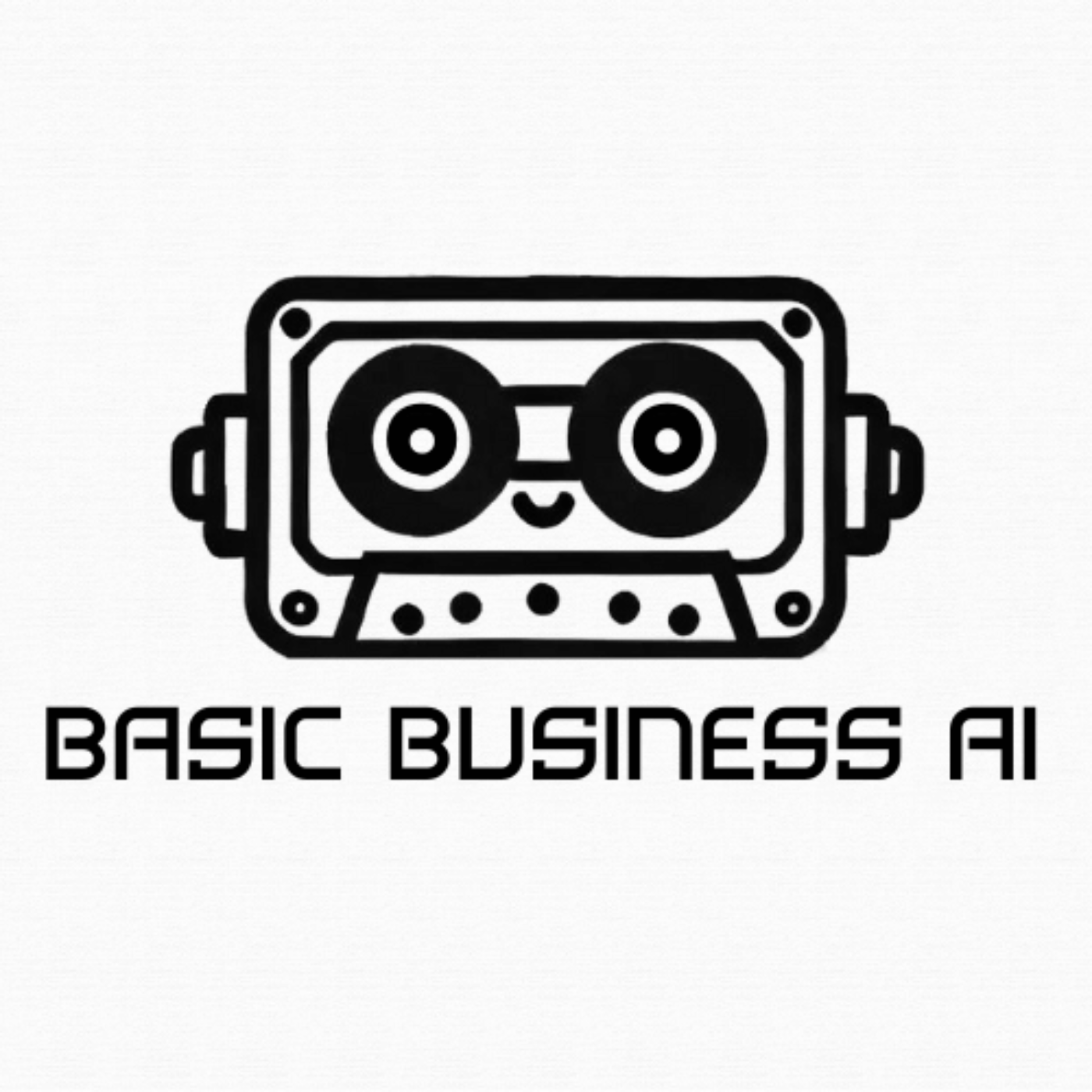Episode Transcript
[00:00:00] Speaker A: Welcome to Basic Business AI, a podcast dedicated to simple AI strategies for businesses who don't want to get an advanced tech degree or hire some marketing bro. I'm your host, Josh Thomas. You can find me on social media.
We bring on regular business owners like you and me to discuss practical strategies, ideas, and perspectives about AI without getting too far into the weeds of the tech BB. AI is sponsored by Anabots. Did you know companies that respond to customer inquiries in less than a minute have a 400% higher chance of closing the deal? Well, our AI powered assistants have an average response time of just 9 seconds, meaning you can close more deals without generating more leads. No tech skills are needed, and you can get started in less than ten minutes. You can go to Anabots AI to learn more. What's more, that's Anabots aihdenhe. Today's guest is Peter Christian. Peter was a founding member, partner, and president of ESpY, a business consulting firm in northeastern Pennsylvania. Previously, he was an executive at Crayola Corporation. He has worked with 300 plus clients in business development. Profit improvement operations is selection and implementation, and project management. He has 40 plus years of experience in strategic and facility planning. Peter, welcome to basic business AI. I just have one burning question for you. In your opinion, from your perspective, how is AI reshaping the future of your industry?
[00:01:33] Speaker B: Well, first of all, thank you for having me. I think the biggest impact is in the customer service area. From what I've seen and dealt with so far, AI is there to allow companies to outreach further to potential clients, or even to existing clients in regards to getting information about them and setting up potential meetings or deals or whatever they need to do whatever their want is. So it allows a greater outreach than they had before, because they don't rely on individuals to have to do it and have large task force of folks. So the salespeople can concentrate then on once they've got somebody they feel is a good possibility, a good reliable client or potential client, that then they can focus in on that instead of dealing with, you know, tens or twenties or hundreds of firms and trying to sort through them to get to the ones that they feel are really good and viable. So that's where I see the biggest outreach is right now. And I think industry is still trying to work through just what that means and how they can expand it even more than where it is right now.
[00:02:57] Speaker A: Yeah. And so you really, I think, hit the nail on the head here, because if we're focusing on customer service, it's not that customer service isn't important.
It's not that you can just easily outsource and delegate it, but it is to a certain extent, something that can be systematized. It can be turned into a process. There are some repeatable and predictable functions to it, and that's where AI really shines right now.
[00:03:25] Speaker B: Yep, I totally agree.
It's a new technology.
It's still in its basic infancy, okay? So companies are getting used to it and how to utilize it. I think that again, like everything else, they need to realize that they can't just rely on it totally. It is a tool to be used, okay? And like any tool, you have to use it properly, but then you have to apply your own guidance into there, your own expertise, your own dealing, you know, because at the end of the day, you're going to make the deal with whomever it is that is identified as possibility.
But over time, again, that can change. Lots of things do with technologies, but the big thing is, at the end of the day, it's still up to the individuals in the company to make things happen.
[00:04:18] Speaker A: That's right. And that's one of the most profound things that I've heard, and it's one of the simplest things to understand because AI is not going to replace humans. AI is going to augment humans and make them more effective and move them upstream so that they can focus on higher value tasks. And what you're saying here is, hey, just like you can go to chat GPT and say, hey, write me a 250 word article on the Hershey theme park. It'll do that. But what it won't do is it won't sound like you and it probably won't be very good. That's where you need the human touch.
[00:05:02] Speaker B: Yep. I still remember before AI was a big thing, when I was still very active in the business world, I would have some clients, and the big thing at that point was systems, ERP systems in particular, and they had a customer service section to it and so forth. And some of them would say, oh, well, I have it now, so I can just turn everything over to them and I can just sit back and it's like, no, you can't. Again, it's a tool, okay? And you got to keep driving at home to people because there are too many that mistake what the capabilities are or rely too much on anybody. It was just like me as a consultant, if you rely on me for everything, you're making a big mistake. At the end of the day, it's your business. You got to pay attention to it. You have to do the right things. Consultants there to help you and to be a tool or a resource or whatever you want to call it. But if you kind of give that up, you're asking for a lot of trouble.
[00:06:00] Speaker A: Indeed. And so I'm curious, as this has been introduced over the last couple of years, where have you seen now that customer service has been somewhat moved over towards AI? Where have you seen people fill up their time? What are they focusing on now? What are some of the kind of strategic moves that the humans are making now that this is kind of off their plate?
[00:06:27] Speaker B: Well, now they can look at who they want to reach out to. What is the demographic that they're looking at? How do they expand that?
Usually companies start very small and they start within a fairly small radius of themselves, and then they expand and so forth. Now they can reach out a lot faster and a lot wider than they were before. It's truly a global economy. And companies that didn't think about dealing outside of maybe their own state or city or whatever the care or even country, they're dealing all over the world now. Okay. So it opens up a lot more possibilities now along with that then, of course, is you got to get the rest of the organization set in place to do that. Okay.
Because it's a big task for sure, but it gives them the opportunity to do that which they may not have had before or might not have thought of before.
[00:07:25] Speaker A: Yeah, makes a lot of sense. And so tell us a little bit more about from your perspective. You've been in project management. You've built many different businesses.
What are some of the key components? Just stepping away from AI a little bit. What are some of the key components that you've found to are essential to the success of growing a business and managing it?
[00:07:48] Speaker B: Certainly having good people, reliable people, because as you grow as an organization, depending on what you started with, as you get to the $10 million range, the $20 million range, the $100 million range, it's not the same company that you started before. You've got a lot more things going on. You're dealing with a lot more companies, both as clients and also as maybe subcontractors to you. So you've got to put good people in place who know what they're doing and who you can trust because you can't manage everything.
You manage certain things, but at the end of the day, you have to turn over a lot of things to the folks who work for you and trust them that they know what they're doing and that they're on the same page that you are. So I think that that's a big thing, is realizing that the, the growth has some pains to it, and you need to take care of those. And again, if you don't, then what started out as a great venture could tumble very quickly for you.
[00:08:54] Speaker A: Peter, wait. I could do everything myself. Nobody's as good as me. Come on, man.
[00:09:00] Speaker B: That's a danger. I've run into folks like that in my consulting time. Okay. And, man, nobody is okay. The best person in the world can't do everything. All right. I see pictures of Jeff Bezos when he started Amazon. You know that little desk in the garage? I guarantee you he's grown to a lot bigger than that. And Jeff Bezos does not know on a daily basis all the ins and the outs that are happening at Amazon. He's got a lot of good people who are helping him to run that company and to, you know, make it what it is today. So. Yeah, yeah. So even Jeff Bezos needs help at times.
[00:09:41] Speaker A: Tell me, from, from your storied career, what, what is one story that really kind of stands out to you? Something just, like, down in the, in the crevices of, like. Yeah, you guys need to hear this one. Like, what's something that's, like, real juicy.
[00:10:00] Speaker B: Real juicy. Real juicy. Like, from a good standpoint or not so good standpoint.
[00:10:04] Speaker A: Players choice.
[00:10:07] Speaker B: Well, I would have some people who would hire me as a consultant and my company because we had certain expertise that they didn't have. All right. And one in particular, they were producing products and so forth for people kind of subcontracting, and they wanted to get into a clean room situation. They had no idea about clean room operations. So we came in to help them because we had dealt with a number of companies and helped to set up clean room operations. So we're going along. And the first thing was that they were putting it on a second floor, and they needed to get the floor straightened out and so forth. So we had to put an elevator in. We did all that stuff. So we were ready for the next phase, which was then to truly make the clean room operations. Now, anybody who's familiar with that, there are a variety of clean room operations, depending on what you're making it. You know, computer chips is usually the one where you need the cleanest operation. You basically need to have no particulates in the air at all. Nothing that can cause a problem with the product. So they get to that. And we're going through the design, and we're coming up with contractors. Well, the equipment's a bit expensive. So one day I get a call from the owner, and he says, we've decided that we really don't want to spend the kind of money. So instead of putting in these fancy filtration systems, we're going to put some air conditioning units in.
And I went, wait a minute. That isn't a clean room operation. That's kind of climate control. It takes some humidity out, has nothing to do with particulates. In fact, probably nothing at all. I said, you can't do that. Well, that's what we decided. I said, well, if that's what you're going to do. I said, first of all, where did you become an expert on that? That's why you hired us. And I'm telling you you can't do it. And secondly, if that's where you're going, not with me. I said, because I don't want to be associated with it. Cause I can't win either way. Okay? So when it doesn't work and you bring people in, clients and say, here's our clean room, and they go, no, that is a clean room. Well, Pete Christian didn't tell us that it wasn't a clean room. He didn't direct us. I said, I'm directing you right now. So you make the choice you want to do it, you're on your own, contracts over. We're done. You know, we'll finish up whatever it is we need to. And that's what happened. The guy called me nasty. And I'm thinking, I'm not being nasty.
[00:12:32] Speaker A: I'm not as nasty as that clean room is.
[00:12:36] Speaker B: I'm trying to tell you the truth. If that's being nasty, then I guess I was nasty. That's a new definition for me. Okay? I always thought it was, be open and honest with your clients and give them the best advice you can. Then you see what happened. So anyway, that was one of many interesting story. And it did. That's what happened. They went off on their own, and they never got a clean room contracts.
And you just. You just shake your head and you go, why did you bother hiring me then? You know, if you're going to hire somebody, you got to trust them. Okay? And again. And you don't turn over everything you question and you understand and so forth. And some of my best clients did that, okay? And then they got involved, and then they knew exactly what they were doing. And those are the kind of people you want to work with, not the ones that are trying to tell you how smart or how cheap. They're going to be about things.
[00:13:27] Speaker A: Yeah, that's right. Awesome. So tell us a little bit about what you're doing now, Peter, and how people can connect with you.
[00:13:34] Speaker B: Well, I'm doing a lot of things. One, I'm doing podcasts like this to take the expertise that I've gained and the knowledge that I've gained over time and to share that with other folks so that it's a help to them. Okay. Again, there's a lot of information out there, but there's also a lot of bad information. So the more I can do to help people that are working through their way, whether it's as a startup and they're trying to expand or they've gone a certain distance and they're struggling a little bit. Sometimes we call plateauing, where you know you're just not growing the way you wanted to. If I can provide some insights to them to help them, that's great. I write. I've got two books that I've authored and are published, and they're both on Amazon. What about the vermin problem and influences and influencers? Both have a lot of stories about goods and bads and companies and companies that succeeded because they did a lot of good things and ones that didn't succeed so well because they didn't do good things and they didn't listen, like the guy with the clean room operation. Okay. I continue to write for magazines and for medium and so forth to get more information out there. I'm teaching project management on a remote basis with a school in Pennsylvania. I live in Florida, so I teach project management. I've gone through about 60 or 70 folks so far and gotten certified, and I'll be doing a class again in September.
I'm doing some webinars, so I've been doing that on project management and capital planning and strategic planning. So that's keeping me busy. And then I'm supposed to be retired, so I have some fun. I go kayaking and go to sporting events and. And different activities like that. So I have a pretty full life.
[00:15:24] Speaker A: Yeah, good deal, man. So is there a way that anybody can reach out and connect with you?
[00:15:29] Speaker B: Absolutely. I am on LinkedIn. Okay. So if you get Peter Christian and you find me under author and consultant and adjunct professor, that's me. Okay. And you can send me a note and say, I heard you on the show, and I thought what you said was interesting, or I didn't think it was interesting. I don't agree with it, and that's perfectly okay. Or if you want to have a dialogue?
[00:15:54] Speaker A: Call him nasty.
[00:15:55] Speaker B: Don't call me nasty. No names. No names, no. Keep it civil. So that's one way. Or you can get into with me on my email, which is my initials, ph, and then my last name, christian, the number 50 threemail.com. send me a note. Same thing. Say, I heard you on the show and, you know, I thought it was interesting and I have this question for you, or I didn't agree with a point, or could you elaborate on something, whatever the case may be, and then we can start a dialogue from there. Like I said, the more I can provide information that can be helpful to you, the better I feel about it. Then I feel like I'm contributing.
[00:16:36] Speaker A: Excellent. Well, hey, we're going to wrap up from here. Thanks so much to our guest Peter Christian, for joining us for a practical conversation about AI and its potential for business. You can learn more about what he does by visiting his LinkedIn profile. Just look for Peter H. Christian if you run a business of any size and you have some ideas or strategies around the topic of AI, we'd love to have you on a future episode as well. We interview business owners of all levels of experience and exposure to AI so that we can represent all voices, especially the 80% to 90% of us who are curious about AI but not trying to be tech geniuses. You can apply for a future episode by going to basicbusinessai.com. and one more time, if you want to install a sales and support team for less than 10% of the cost of a single employee, get yourself an anabot. Learn more at anabots AI. We'll see you next time on basic Business AI. And by the way, if you like this episode, be sure to tell your friends. See you later.



